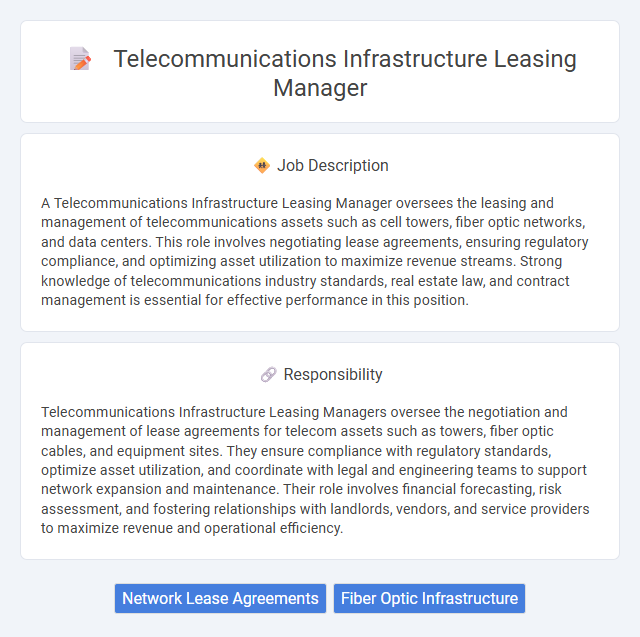
A Telecommunications Infrastructure Leasing Manager oversees the leasing and management of telecommunications assets such as cell towers, fiber optic networks, and data centers. This role involves negotiating lease agreements, ensuring regulatory compliance, and optimizing asset utilization to maximize revenue streams. Strong knowledge of telecommunications industry standards, real estate law, and contract management is essential for effective performance in this position.
Individuals with strong organizational skills and a keen understanding of telecommunications networks are likely to thrive as Telecommunications Infrastructure Leasing Managers. Those who excel in negotiation and contract management may find this role particularly suitable, as it involves maintaining relationships with vendors and overseeing leasing agreements. Candidates lacking attention to detail or interpersonal skills might struggle to meet the demands of this position effectively.
Qualification
A Telecommunications Infrastructure Leasing Manager must possess strong expertise in managing lease agreements, facility operations, and contract negotiations within the telecom sector. Proficiency in real estate law, financial analysis, and network infrastructure is essential for optimizing asset use and ensuring regulatory compliance. Advanced skills in project management and stakeholder communication support effective coordination between service providers and property owners.
Responsibility
Telecommunications Infrastructure Leasing Managers oversee the negotiation and management of lease agreements for telecom assets such as towers, fiber optic cables, and equipment sites. They ensure compliance with regulatory standards, optimize asset utilization, and coordinate with legal and engineering teams to support network expansion and maintenance. Their role involves financial forecasting, risk assessment, and fostering relationships with landlords, vendors, and service providers to maximize revenue and operational efficiency.
Benefit
Telecommunications Infrastructure Leasing Managers likely benefit from stable career growth due to the increasing demand for network expansion and modernization. They probably enjoy competitive salaries combined with performance-based bonuses, reflecting the critical role they play in securing and managing valuable infrastructure assets. Access to industry-leading technology and professional development opportunities may also enhance job satisfaction and long-term career prospects.
Challenge
Managing telecommunications infrastructure leasing likely involves navigating complex regulatory environments and negotiating contracts that must balance tenant needs with infrastructure limitations. The role probably requires continual adaptation to technological advancements and market shifts, which can challenge existing leasing models and revenue projections. Effective management may depend on anticipating potential disputes and maintenance demands while ensuring consistent service delivery.
Career Advancement
Telecommunications Infrastructure Leasing Managers oversee the leasing and management of telecom assets, such as towers and fiber networks, driving significant revenue growth for companies. Career advancement in this role often leads to senior management positions like Director of Infrastructure Leasing or Vice President of Asset Management, where strategic decision-making and portfolio expansion are key responsibilities. Expertise in contract negotiation, regulatory compliance, and market analysis enhances prospects for rapid promotion and leadership opportunities within the telecommunications industry.
Key Terms
Network Lease Agreements
Telecommunications Infrastructure Leasing Managers specialize in drafting, negotiating, and managing Network Lease Agreements to optimize asset utilization and revenue growth. They ensure compliance with regulatory standards while coordinating lease terms for fiber, towers, and wireless infrastructure to maximize network efficiency. Expertise in contract management, vendor relations, and lease portfolio analysis is critical for achieving strategic objectives in telecommunications infrastructure management.
Fiber Optic Infrastructure
Telecommunications Infrastructure Leasing Managers specializing in fiber optic infrastructure oversee the acquisition, negotiation, and management of lease agreements for fiber optic networks, ensuring optimal utilization and network expansion. They collaborate with service providers, property owners, and regulatory bodies to secure rights-of-way, manage lease terms, and maintain compliance with industry standards. Proficiency in fiber optic technology, contract law, and project management is essential to maximize asset value and support high-speed telecommunications services.
 kuljobs.com
kuljobs.com